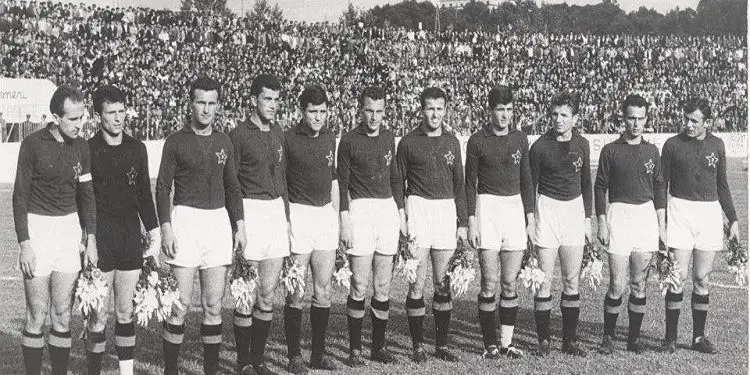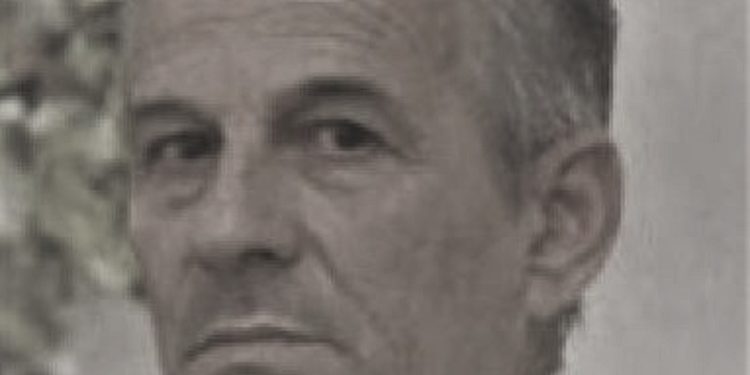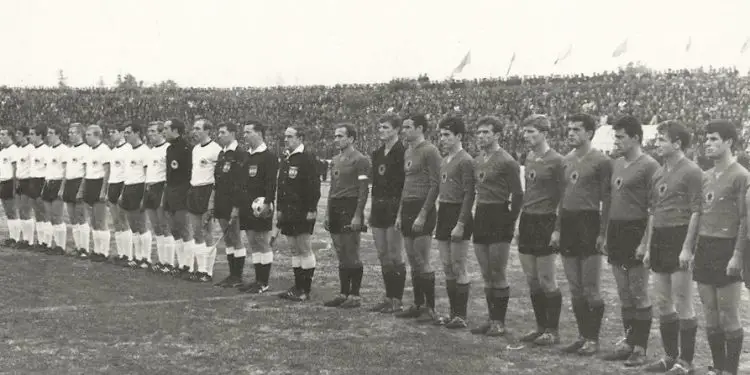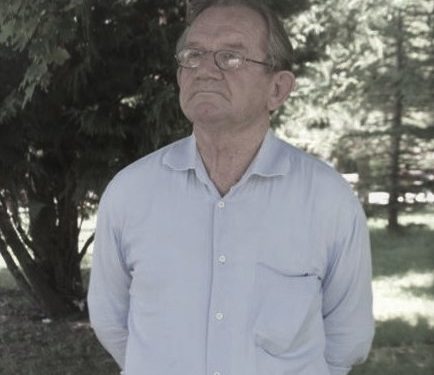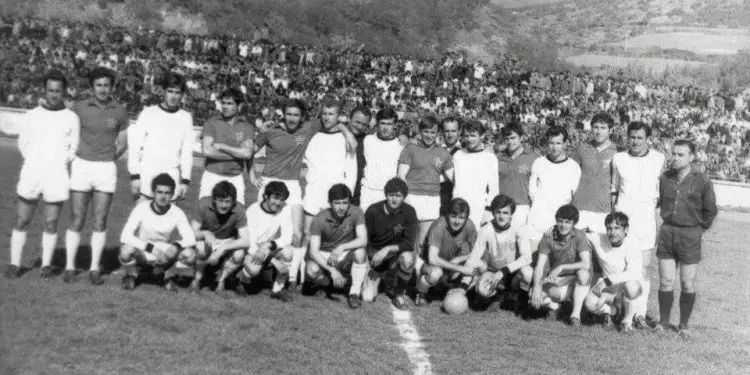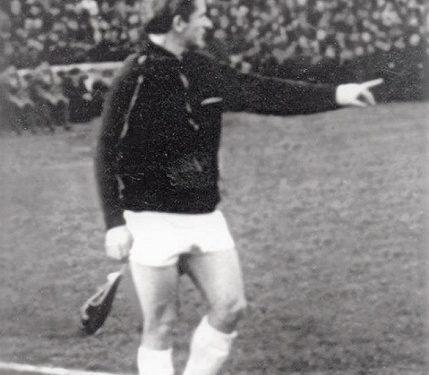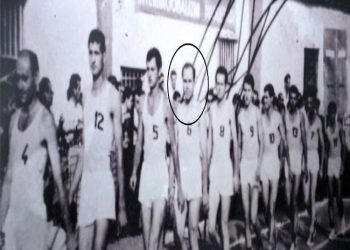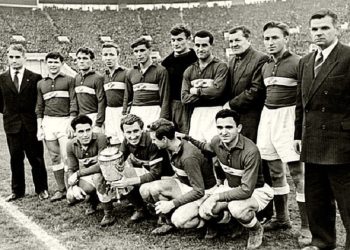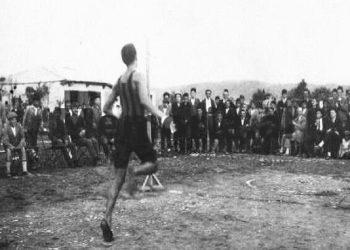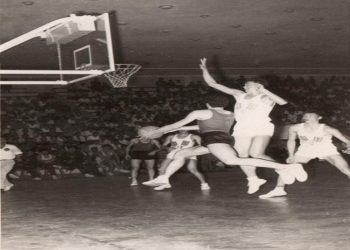From Vepror Hasani
The sixth part
Memorie.al / We had let him meet in one of the bars in Korça. I saw that he was coming with his “Cadillac”, (that’s what he called the bike), which he goes out with every day…! After we ordered, “Honored Master of Sports”, Teodor Vaso, decorated with the ‘Gold Medal’ – for outstanding merit in sports -, football player from 1957-1973 and coach from 1973 until today, started to tell me. Recounted one of his football stories: “Everything about my stay in the ‘Partizani’ team or not, was left in the hands of the generals…” he began to tell me.
Continues from last issue
The confession of the “Merited Master of Sports”, the football legend, Teodor Vaso
Team formation
“The formation of the match against Cologne was determined, but none of the players knew anything. Everything was considered a secret. However, the next day everything would become clear. The team would include: Mikel Janku, Fatbardh Deliallisi, Teodor Vaso, Fatmir Frashëri, Osman Mema, Lin Shllaku, Robert Jashari, Panajot Pano, Miço Ndini, Niko Bespalla and Kolec Kraja. I would find out about my participation in the composition of the team somewhat by accident.
Someone told me that General Vaskë Gjino was looking for me. He had come in his car. Gjino served in the Ministry of Defense with the group of other generals of the General Staff of the Army. After a while I met him: “Vaso,” he told me, “we are going to play with the football greats.” Cologne has world champion players in its composition. For this reason, the team headquarters has made a decision: You will replace the team captain who played center-back, Miço Papadhopuli. The coaches have thought of this placement as the safest solution. I wanted to know, what is your opinion?”.
The news he gave me made me happy, I would be the center-back of the team. ‘When I was with “Skënderbeu”, – I answered, – I played for three years in a row as a center-back in front of all the Albanian attackers, even in front of the best of our national team. These words came out to me with passion, but then I lowered my tone: ‘I have strong impulses that live in the ferment of my being waiting for the moment to face and measure with the European attackers. Without such ambition there can be no competitive duel. You will see him on the playing field, comrade general’!
Vaskë Gjino smiled and extending his hand to greet me said: “See you Vaso”. “Thank you, General”! – I hastened to answer him. Everything was already clear to me: in Vietnam they didn’t take me for elbow issues. My placement in the center of the defense was conditioned by several factors: together with the reactive centre-forward, Panajot Pano, we were the two fastest footballers in Albania, coming out of the tests in the national team. My transition from midfielder to central defense opened up the place of a midfielder or striker.
As a result of such a move, the Durres player, Niko Bespalla, entered the lineup. He shot free kicks, gaining momentum from a distance which he defined by 13 steps. However, my placement in the center of the defense was not an easy decision, because the club was always interested in its players and not in the sportsmen-soldiers who would return to their country of origin. For this reason, there were those who sincerely congratulated me, just as there were others who spoke neither white nor black”.
Arrival in Cologne
“The Cologne team had arrived in Tirana. Cologne, the champion of the Federal Republic of Germany, had the players of the national team, Overat, Weber, and the world champion, center-forward Shafer. Their arrival created great confusion. Suddenly the news spread that they had brought German cuisine with them. They had arrived with a bag of food that would supply the team’s needs until the day of departure. The news creates confusion even in the government. He had to face this situation that the Germans were creating.
Minister of Defense Beqir Balluku, one of the main leaders of the high dome of the Albanian State, gave urgent orders: “In the hotel “Dajti”, nothing should be missing”. “For everything that will be needed,” said Balluku, “it will be provided by Italy”. The government plane was made available to supply food that would come from abroad. All measures were taken. The hall where the banquet was held shone with lighting, the clothes of the service personnel, curtains, tablecloths, service cutlery were in demand. Opera singer Gjoni Athanas sang. With a small group of dancers, we also danced. The evening at the “Dajti” hotel was a real party. Apart from beers, there were no alcoholic beverages.
We felt satisfied that the Germans had received us well, it even seemed to us that they were looking at us somewhat surprised, perhaps they did not think that they would find this hospitality. The president of the German team said at the banquet: “We are very pleased with your reception. I wonder if we in Germany will be able to respond so well to your hospitality”? The match started on the afternoon of September 12, 1964. The steps of the “Qemal Stafa” stadium were filled by 18 thousand sports fans.
The duel ended with the result 0-0. There were also those who guessed that the Germans had underestimated the “Partizan” team. However, until that day, foreign teams had scored on the Albanian goal. In 1950, the team “Spartak” of Moscow scored, in 1951, “Dozha” of Budapest, in 1955, “Ruda Zvezda” of Bern, in 1959, “Forverst” of Berlin, in 1959 , “Admiraltejec”, in 1960, “Leningrad”, while “Norçepingu” of Sweden, in 1962, ended the match scoring 1-1. We were already waiting for how we would perform in the match with Cologne in Germany”!
Towards Cologne
“We were headed to Cologne. The dream of seeing the Western World simmered within my soul. We were fortunate to enter the heart of European civilization. Four players were not included in the list of the team that would face the transfer match: Niko Bespalla, Sul Maliqati. Kolec Kraja and Miço Papadhopulli. We were entering German soil from above. The plane was approaching Cologne from a short distance. On the Brussels-Cologne road, below us, two fiery threads moved against each other. From above, those two elongated, shining threads gave off a special beauty.
We had seen such phenomena only in movies. The plane seemed reluctant to go to town. He was flying from the paved airport. You’d think someone had ordered it to sit down slowly so that the people, the passengers, could gaze at the city in the West of the FRG, near the border with Belgium. Already before us was the whole Western World. The evening was beautiful. Come from above, with a fabulous beauty to marvel, to bewilder, the famous Germany unfolded before our eyes. After Norröping, a Swedish city, Partizan went to Western Europe for the first time, 20 years after the Second World War. We were looking at a capitalist civilization. The Germans in a very short time had raised a miracle over the ruins.
The Cologne club staff put us up in a luxury hotel in the city center. The food menu came to our tables at the order of the coach and the doctor. Inside the canisters, placed on each table, were two types of fruit that we had only heard the name of: banana and pineapple. Where the plate was placed for each player, there were two chocolates with walnuts and hazelnuts every morning. The waiters did not forget to ask us when we sat down to eat: “What do you want, besides the ordered assortments?”
I found the environment of the bus that would take us to the moment when it would leave us at the airport to leave Germany wonderful. We took the first route to see the city. The boulevards of Cologne shone with light. In addition to the new and modern buildings, I was very impressed by the streets, sidewalks, shops, goods, food, packaging, fruits, vegetables…! “The war destroyed 85% of the city, churches and hospitals remained untouched. They did not hit the planes of the allies”, Cicero told us.
On the first day in the lobby of the hotel and in its premises, there were all kinds of people: escaped Albanians, those who left before the Second World War from the former Yugoslavia, etc. Everyone wanted to get in touch, especially with the footballers who stood out from the young age. The orders they gave us instructed us to avoid conversations with the Albanians, especially the so-called “enemy” contingents.
Towards the stadium
“Finally, the day of the match had arrived. We left the hotel when Cologne was twinkling with the glow of colorful lights. From a place where the lighting at night was one color, the fascinating view of Western cities confused you: river of cars, crowds of people on the sidewalks rushing towards the stadium of Cologne, beautiful women and girls, faces with gilded skin, clothes, lustrafin shoes. Looking through the bus window, I looked at everything: shoelaces, cigarettes, waist belts, shirt buttons, glasses, women’s hats, earrings, bags, bracelets, combs, hair, hair clips, shapes, colors.
The styles gave him another world. Everything for the locals was ordinary, everything seemed gilded to us. In front of the bus that took us to the stadium was a traffic policeman with his blue motorcycle and white fenders. He demanded that all cars open their wings to go to the top of the road, where the traffic lights were. A hand wave came from the sidewalk. The person waved his hand above his head, while some of his friends nodded. I thought: “It’s the red and black flag, over there in the mosque” Our patriots rejoiced.
Their spirit remained in that flag. From the other side of the road came a loud call: “Partizani…, Tirana…”. Although the motorized police rushed by, ushering us out into the empty lanes of the streets, we reached the stadium after an hour’s drive through the streets of the city. After we got ready as usual, we went out to warm up, wearing red jerseys and white socks. As soon as we left the changing rooms behind, the dazzling view of the Cologne stadium opened up. 50 thousand spectators! The stadium was illuminated by many projectors that emitted light from four tall metal towers, surprising to me and to those playing for the first time at night with lights.
Match
“We started the game surrounded by a completely surprising environment. It was September 29, 1964. In our psyche, at least as I experienced it, there were electrifying excitements, emotions, surprise and a little bit of fear. Lin Shllaku and behind him Fatmiri, (Frashëri) Bardhi (Deliallisi), Miçoja, (Ndini), were shouting: “No concessions guys! We saw them in Tirana; they have nothing more than us!” We were in a magical sports world, more than sports. At that moment, another Theodore inside my chest spoke to me: ‘Oh today, oh never! Show rival players, spectators, friends, what you are capable of! As I warmed up, I felt a strange noise coming from the steps of the stadium.
Everything came like a downpour. People’s voices, cries, drums, freckles, in an unusual lighting for an Albanian player. At times the noise became deafening and the psychic tension sought to unbalance you. “You have my back, don’t be tempted”, said Mikel Janku. “I am in front of you, I will protect you well, Mikel”, – I answered, shaking his hand. “Success”, he told me. The blood was rushing through our veins, through our chest, our heart was beating fast. The first 45 minutes of the match ended with clean sheets. Slowly, in the second half, on the steps of the stadium, the spectators began to worry. The 0-0 result teased, stressed the sensibility.
The nervousness from the people on the stairs carried over onto the pitch to the German players. The German footballers felt that the game had slipped away. The situations of the game became threatening for the home team’s goal. Panajot Pano, in his most brilliant game up to that match, confounded the entire German defense. Our attack shot 13 times, 8 of them were in the goal square and 2 of them, the Cologne goalkeeper, Shumaker, punched them with difficulty. Our attack together with Panon created this beauty. In 70 minutes, with very serious interventions, the local players took out of the game, traumatizing the brain of the organism of our game, Bert Jashar, a few minutes later they also hit Panon. He left the field of play to be treated.
Just a few moments later, they hit our right defender Fatmir Frashër in the knee. They achieved their goal. With unequal forces, the Germans began to threaten dangerously…! When it became clear to the German attackers that it was impossible to get the upper hand with fair sportsmanship, then they provoked the heavy game…! Three injuries in a few moments, with the calls of 50,000 spectators demanding a goal at all costs, with the indifferent and scandalous attitude of the Swiss referee, the first goal was scored in the 78th minute. (K. Grillo, “Sporti Popullor” newspaper: 29.09.1964). From the assessment of the game, by K. Grillo, the uniqueness of the game of the defense unit stands out. “Each player gave their best: Deliallisi, Vaso, Frashëri, fought fearlessly for the first ball. They intervened with courage and avoided the creation of corridors by the opponents as much as possible”.
Some Cologne sports journalists, influenced by the unexpected game of the “Partizan” team, sent words full of pathos and respect to the newspapers. Being in the role of central defender, I wanted to be played at all costs in the defensive lines according to a new game. When the game was played in our attack, I wanted the defense to be pushed forward, to create a two-scallion defense; close-knit midfield and defense. This movement in the block created larger spaces behind the defense department, which allowed the use of long balls by the Cologne players. This trap created the opportunity to put my speed into action, in a duel with the German attackers. That kind of duel ended with complete success for us.
Duel
I have never seen a game like it; I have never felt such thrilling emotions as in that stadium that was boiling with a deafening sound. Over 50 thousand sports fans shouted: “We want a goal…, we want a goal…”! In the penultimate 10 minutes, with two players out injured, the Germans threw 9 players into the attack. It was left in our attack Foto Andoni. I asked for T. Shehu to return to defense, instead of F. Frashër, while P. Pano was being treated. In these moments, concentrated in defense, the shot at our goal was prepared. After many unsuccessful crosses, German centre-forward No. 8 Schafer, who was playing face-to-face with me, put his right hand on my shoulder, preventing me from jumping. He hit the ball, passing it to one of his friends behind us. He found himself uncovered, shot and scored.
A photographer presented me at the banquet with a picture in which Shafer was clearly visible. When the first goal was scored, the moment when Cologne sent the ball into our net with incredible effort, the stadium steps caught fire. Sheets of newspapers and letters were burning, calls and shouts like a giant volcano, grabbed two hearts. From the stairs came two people who had finally separated from life, dreaming of the victory of their team, Cologne. The next day, in one of the sports newspapers of Cologne, he wrote the statement of the coach of the German team, Georg Knoplle: “The game of ‘Partizan’ made his defense invincible for 80 minutes. The game of goalkeeper Janku and center back Vaso was surprising. The two points where we focused our goals to score a goal. Attacking with the irresistible Pano gave breathing space to his defense as well. With his play he carried some of the weight of the game. I liked goalkeeper Janku, Vaso and the fantastic Pano”.
After the match, the banquet began at midnight. There came a moment when the president of Cologne football said: “You played well and hard, both teams. Your team played much better than in Tirana. You brought me very emotional moments. The way the game was played, it was not clear who would win the game.”
Petrac Sinjari
We flew from Germany to Tirana by plane. I was remembering everything that had happened with the Germans, but I don’t know why at that moment my friend Petraq Sinjari appeared before my eyes. After a day when we lined up to start training, Petraqi didn’t show up anymore. Someone said that he was admitted to the Military Hospital. Months passed and he wasn’t coming back. His parents begged us to ask Petri Dumas for help so that their son could be cured abroad. Sinjar was suffering from leukemia. For this reason, together with some other athletes, we went to Petrit Dume. General Dume welcomed us in the courtyard of the Ministry of Defense, but with obvious regret he told us: “Leukemia is a disease that cannot be cured; you continue to stand by the family of that boy…”! After that meeting we went to Sinjar’s parents’ house. His father was waiting for an answer: “The general told us that it will become impossible for Petraq”, I told him, because I didn’t know what other answer to give them.
Sometime later, Petro and I both left the door of the Military Hospital. On my side he walked with the death that had taken over his whole being. His face was badly deformed. “After a few days I will go out for training, he told me. Even the doctors sent me like this…! Vaso, for the new championship I will be ready for the game…”. ‘Exercises will make you stronger…’, I replied. The following days increased the distance of the road for Sinjar to approach the football field. In addition to the jersey of “Partizan”, the ezmer boy with an amber spirit, took with him beyond life and the medal of the year 1963-’64 where it was written: “CHAMPION”. I don’t know why I remembered this story at that moment when we were returning from Germany…”! This is how Teodor Vaso concluded his story ‘The Meritorious Master of Sport’. Memorie.al




